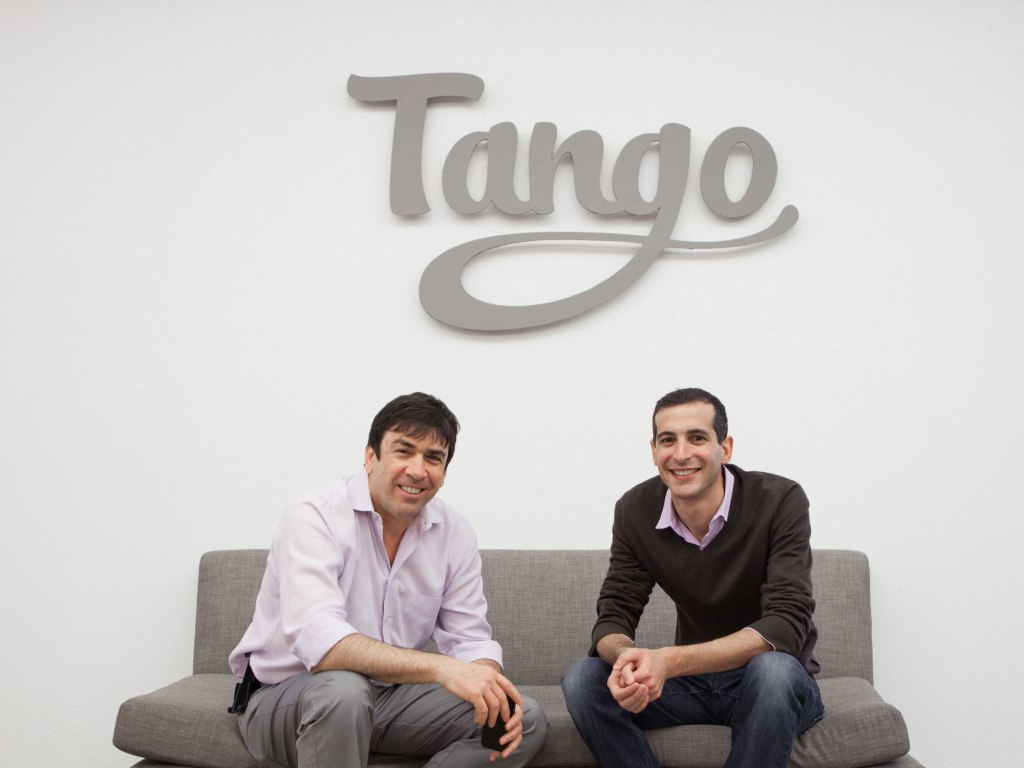Fresh from laying off 9 percent of its 200 staff and closing down its e-commerce service at the end of 2015, Tango has made a change at the top with CTO and co-founder Eric Setton (right in image above) stepping in to replace fellow co-founder Uri Raz (left in image above) as CEO. Setton was formally announced in the hot seat during a meeting with staff on Monday, sources inside Tango told TechCrunch, and the company and Setton both confirmed the move today.
“This is a great opportunity for me, I’m very grateful for Uri,” Setton told TechCrunch in a phone interview. “We’ve been working together on [this handover] for the last few months.”
“I have worked alongside my co-founder Eric for eight years, and throughout this time I’ve seen him grow and become a true leader,” Raz said in a statement. “I’ve served as a founder and CEO for over 28 years — half of my life -– and I believe it is time for me to pass the torch to the younger generation — a generation with bright leaders and a bright future.”
Setton said that Raz, a serial entrepreneur who founded AppStream (sold to Symantec) and Dyyno, is taking a less active role as Executive Chairman in order to make more time for his family, which is based in his native Israel. However, it’s impossible to ignore that the change comes just weeks after an explosive report into unrest at Tango — which become a unicorn when Alibaba lead its $280 million Series D round in 2014.
A report on Josh Dickson’s Syrah blog painted Raz, which founded Tango in 2009 with Setton, as an unpredictable leader who ruled with an iron fist, upset many staff and struggled to maintain a focused business plan to move Tango forward. The latter included canceling plans to work with Alibaba on a new mobile messaging app in China dubbed ‘Tango Lite’.
“Nobody will say anything because they are deathly afraid of Uri,” one anonymous source who used to work at Tango told Dickson. “That company is beyond [expletive]ed up.”
Setton dismissed the report as incorrect, and complaints from Tango led Business Insider to pull the story from its website less than a week after Dickson had agreed to let the publication syndicate his report. Shortly after, I emailed Business Insider’s Executive Editor Jay Yarow for clarification of why the story was pulled, but Yarow did not reply.
Fear and loathing at billion-dollar mobile messaging startup Tango https://t.co/XHnSCXGGdl pic.twitter.com/BVmgc7H0ua
— Business Insider (@BusinessInsider) December 4, 2015
The Business Insider link now redirects to the publication’s homepage not the article itself.
Tango and Setton may dismiss Dickinson’s report as incorrect, but I’ve been in contact with multiple sources who once worked, or still work, at Tango, all of whom said that the story was accurate. Furthermore, TechCrunch understands that the change in CEO came about because Tango’s board — on which Raz and Setton both have a seat — specifically requested Raz’s resignation.
Beyond the negative press that his leadership attracted, TechCrunch understands from a source close to the board that the board is also unhappy about a secondary share sale that took place in 2014 following the Alibaba deal. Ukrainian-born billionaire Len Blavatnik, owner of Warner Music Group, originally invested in Tango in 2011 via his Access Industries group, but sought to increase his holding after the Alibaba-led Series D round closed, as Reuters reported at the time.
According to Reuters, just months after a secondary sale enabled 200 Tango staff to sell $8 million of shares, the company arranged a further secondary sale that enabled “early investors and shareholders” to sell more stock to Blavatnik (and perhaps others) in a deal that valued Tango at $1.5 billion. That’s one-third higher than its Series D valuation, and therein lies the controversy. Our source explained that Tango’s board members believe that the founders manipulated user figures and other data to sell a portion of their shares at this higher rate.
“We’re in a world where when something gets hot everyone wants in. It drives the valuation up and makes it easier for people to get liquidity,” one source told Reuters at the time of its story.
While neither Tango nor Access Industries ever confirmed the deal — Setton declined to comment when we asked him this week — we know that the transaction took place because the FTC last year filed charges against Blavatnik for it. He subsequently settled with a $656,000 payout.
From the FTC’s announcement in October 2015:
According to the FTC, Blavatnik, via his company Access Industries, purchased shares of TangoMe that brought the value of his stake in the company to approximately $228 million. Under the HSR Act, parties must notify the FTC and the Department of Justice of large transactions that affect commerce in the United States and otherwise meet the statutory filing requirements.
The FTC charged that Blavatnik was required to report the transaction to U.S. antitrust authorities under the HSR Act. According to the complaint, Blavatnik eventually made a filing for the acquisition, acknowledging that the acquisition was reportable and that his failure to report the transaction in a timely fashion was inadvertent.
Blavatnik previously led a $40 million round in Tango. Even if he had led that entire round (which he didn’t) the FTC’s data means he snapped up at least $188 million in stock from the 2014 transaction. That’s a lot more than the original $8 million offering — although it isn’t clear which stakeholders sold out to Blavatnik the second time, it certainly seems murky.

Jumping back to the current day, Tango is a unicorn in transition.
The startup’s Series D came weeks after Facebook acquired WhatsApp for $19 billion and mobile messaging was a new and hot topic. Now, entering 2016, messaging has stabilized as the winners in each market have risen. But Tango’s position in the market isn’t clear, and it doesn’t hold dominant marketshare in any single country globally.
While WeChat owns China, Kakao Talk dominates South Korea, Line is big in swathes of Asia and WhatsApp closes in on one billion active users, the U.S. market is still without a single winner. Snapchat, Kik, Facebook Messenger, Apple’s iMessage and WhatsApp all have more users and have established themselves all popular ways to chat in North America. Tango — which burst on the scene in 2010 as a video calling app that clocked one million downloads inside 10 days — seems to have watched the competition bypass it.
Tango failed with a move into commerce, didn’t move the needle via a partnership with Spotify, and it has a 2014 investment fund for games that is yet to make any investments, and a strategic relationship with Alibaba that it is yet to take advantage of. While the new trend is around bot-based content, Tango opted for in-app channels that didn’t appear to yield engagement among users. It is also probably the only major chat app that includes in-app advertising messages, a concept that WhatsApp’s founders strongly oppose.
Mountain View-based Tango claims 350 million registered users. In May 2015, at the launch of Tango Shop, that figure was 300 million registered users, which wasn’t a big jump on the 200 million registered users that it announced in March 2014, when Alibaba invested and Tango announced its first (and only) monthly active user count: 70 million.
That user count looks a lot smaller right now, though.
TechCrunch has viewed documents which show that the company’s service counted 48.5 million monthly active users as of October 2015. Worryingly, that figure was down 2.2 million on the previous month. Tango’s daily active user count also dipped month-on-month from 14 million to 13.5 million for October. Revenue for the month — which is primarily driven by advertising and, Setton told us in December, was at an all-time high over the summer of 2015 — was $2.4 million, down just $60,000 from September. It isn’t clear, however, what Tango’s burn rate was for the month.
Interestingly, Tango’s internal reports peg its messages per week at 1.32 billion. That seems low considering the user numbers. Telegram, a app of similar size that claims 60 million monthly users, sees 12 billion messages per day. While WhatsApp, the global leader, reported 30 billion messages per day one year ago. Low message volume is a concern because it suggests that even active users aren’t connecting with large networks of friends, which is the core tenet of a successful messaging app and crucial for growth.
A further sign of problems at Tango are an additional round of layoffs, beyond the 30 staff who were cut in the final quarter of 2015, which are coming soon.
TechCrunch understands from a source close to the board that Tango has approved plans to shutter the company’s office in Beijing, China, which — when carried out — will result in an additional 40 layoffs. There may, we are told, also be further headcount reductions made at Tango’s U.S. headquarters in Mountain View and its mobile games-focused office in Austin, Texas.
Setton denied the reduction plans. He told TechCrunch that Tango’s Beijing office remains a critical R&D hub for the company and will not be closed. According to its website, Tango is currently hiring for three roles, a product design position in Mountain View and two engineering vacancies in Austin.
While it appears that recent events at Tango have been tumultuous, the appointment of Setton to CEO is positive step forward. CTOs are often the tech guys hidden from the press, but, in his previous role, Setton was the media-friendly face and regular spokesperson for Tango. Multiple former and current Tango staff that TechCrunch has been in contact with have spoken highly of his leadership and vision for Tango.
But Setton clearly has a big job on his hands. Making Tango as relevant as the likes of Snapchat, WhatsApp and Facebook Messenger is no easy task for the once fast-growing company. It could even be too late. 2016 is going to be a very important year for this unicorn.































Comment